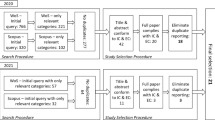Abstract
Software development methodologies may be described in the context of an underpinning metamodel, but the precise mechanisms that permit them to be defined in terms of their metamodels are usually difficult to explain and do not cover all needs. For example, it is difficult to devise a way that allows the definition of properties of the elements that compose the methodology and, at the same time, of the entities (such as work products) created when the methodology is applied. This article introduces a new approach to constructing metamodels and deriving methodologies from them based on the concept of powertype. It combines key advantages of other metamodelling approaches and allows the seamless integration of process, modelling and documentational aspects of methodologies. With this approach, both methodology components and project entities can be described directly by the same metamodel.
Similar content being viewed by others
References
Atkinson, C.: Supporting and applying the UML conceptual framework. The Unified Modeling Language. In: Bézivin, J., Muller, P.-A. (eds.) 〈UML〉 1998: Beyond the Notation LNCS 1618, pp. 21–36. Springer-Verlag, Berlin (1998)
Atkinson, C., Kühne, T.: Rearchitecting the UML infrastructure. ACM Trans. Modeling and Computer Simulation 12(4), 290–321 (2002)
Atkinson, C., Kühne, T.: Processes and products in a multi-level metamodeling architecture. Int. J. Software Eng. and Knowledge Eng. 11(6), 761–783 (2001)
Atkinson, C., Kühne, T.: The essence of multilevel metamodelling. In: Gogolla, M., Kobryn, C. (eds.) 〈UML〉 2001 – The Unified Modeling Language. Modeling Languages, Concepts and Tools LNCS 2185, pp. 19–33. Springer-Verlag, Berlin (2001)
Atkinson, C., Kühne, T.: Meta-level independent modelling. International Workshop on Model Engineering at the 14th European Conference on Object-Oriented Programming 2002. Sophia Antipolis and Cannes, France (2000)
Atkinson, C., Kühne, T.: Strict profiles: Why and how. In: Evans, A., Kent, S., Selic, B. (eds.) 〈UML〉 2000 – The Unified Modeling Language. Advancing the Standard LNCS 1939, pp. 309–322. Springer-Verlag, Berlin (2000)
Atkinson, C., Kühne, T.: Model-driven development: a metamodeling foundation. IEEE Software 20(5), 36–41 (2003)
Dahchour, M., Pirotte, A.: Materialization and its metaclass implementation. IEEE Trans. Knowledge and Data Eng. 14(5), 1078–1094 (2002)
D'Souza, F.D., Wills, A.C.: Objects, Components, and Frameworks with UML: The Catalysis Approach. Addison-Wesley, Upper Saddle River, NJ (1999)
Duncan, W.R.: A Guide to the Project Management Body of Knowledge. Project Management Institute. 176 pp. PA, USA (1996)
Firesmith, D., Henderson-Sellers, B.: The OPEN Process Framework – An Introduction. Addison-Wesley, Harlow, UK (2002)
Gonzalez-Perez, C., Henderson-Sellers, B.: Templates and resources in software development methodologies. J. Obj. Technol. 4(4), 173–190 (2005)
Henderson-Sellers, B., Unhelkar, B.: OPEN Modeling with UML. 245 pp. Addison-Wesley, London (2000)
Martin, J., Odell, J.J.: Object-Oriented Methods: A Foundation. Prentice-Hall, Inc., Englewood Cliffs, NJ, USA (1995)
Martin, J., Odell, J.J.: Object-Oriented Methods: A Foundation (UML). Prentice Hall, Englewood Cliffs, NJ (1998)
Odell, J.J.: Power types. Journal of Object-Oriented Programming 7(2), 8–12 (1994)
OMG 2002. Meta Object Facility (MOF) Specification, version 1.4. OMG document formal/2002-04-03. http://www.omg.org, accessed 12th (July 2002)
OMG 2001. OMG Unified Modelling Language Specification, version 1.4. OMG documents formal/01-09-68 through 80 (13 documents). http://www.omg.org, accessed 12th (July 2002)
OMG 2001. Software Process Engineering Metamodel Specification. OMG document ptc/2002-01-23. http://www.omg.org, accessed 12th (July 2002)
OMG 2003, SPEM 2.0 RFP draft. OMG document ad/03-09-02, http://www.omg.org, accessed 6th (October 2003)
Pirotte, A., Zimányi, E., Massart, D., Yakusheva, T.: Materialization: a powerful and ubiquitous abstraction pattern. In: Bocca, J., Jarke, M., Zaniolo, C. (eds.) Procs. 20th Int. Conf. Very Large Data Bases (VLDB '94) pp. 630–641 (1994)
Rolland, C., Prakash, N., Benjamen, A.: A multi-model view of process modelling. Requirements Eng. J. 4(4), 169–187 (1999)
Seidewitz, E.: What models means. IEEE Software 20(5), 26–31 (2003)
Standards Australia, Standard Metamodel for Software Development Methodologies. AS 4651-2004, Standards Australia (2004)
Author information
Authors and Affiliations
Corresponding author
Additional information
Communicated by Prof. James Bieman
Cesar Gonzalez-Perez is a post-doctoral research fellow at the Faculty of Information Technology at UTS, where he works in object- and agent- oriented methodologies and metamodelling. Cesar is the author of over 40 publications and has led 12 successful software development projects. Cesar has previously worked in archaeology as well as biology, both in industry and academe. Cesar is the founder and former technical director of Neco, a company based in Spain specialising in software development support services, which include the deployment and use of the OPEN/Metis methodological framework at small and mid-sized organisations.
Brian Henderson-Sellers is Director of the Centre for Object Technology Applications and Research and Professor of Information Systems at University of Technology, Sydney (UTS). He is author of eleven books on object technology and is well-known for his work in OO methodologies (MOSES, COMMA, OPEN, OOSPICE) and in OO metrics and, more recently, in agent-oriented methodologies. Brian has been Regional Editor of Object-Oriented Systems, a member of the editorial board of Object Magazine/Component Strategies and Object Expert for many years and is currently on the editorial board of Journal of Object Technology and Software and Systems Modelling. He is Editor of the International Journal on Agent-Oriented Software Engineering. He was the Founder of the Object-Oriented Special Interest Group of the Australian Computer Society (NSW Branch) and Chairman of the Computerworld Object Developers' Awards committee for ObjectWorld 94 and 95 (Sydney). He is a frequent, invited speaker at international OT conferences. In 1999, he was voted number 3 in the Who's Who of Object Technology (Handbook of Object Technology, CRC Press, Appendix N). He is a member of the Review Panel for the OMG's Software Process Engineering Model (SPEM) standards initiative and a member of the UML2.0 review team. In July 2001, Professor Henderson-Sellers was awarded a Doctor of Science (DSc) from the University of London for his research contributions in object-oriented methodologies.
Rights and permissions
About this article
Cite this article
Gonzalez-Perez, C., Henderson-Sellers, B. A powertype-based metamodelling framework. Softw Syst Model 5, 72–90 (2006). https://doi.org/10.1007/s10270-005-0099-9
Received:
Accepted:
Published:
Issue Date:
DOI: https://doi.org/10.1007/s10270-005-0099-9




